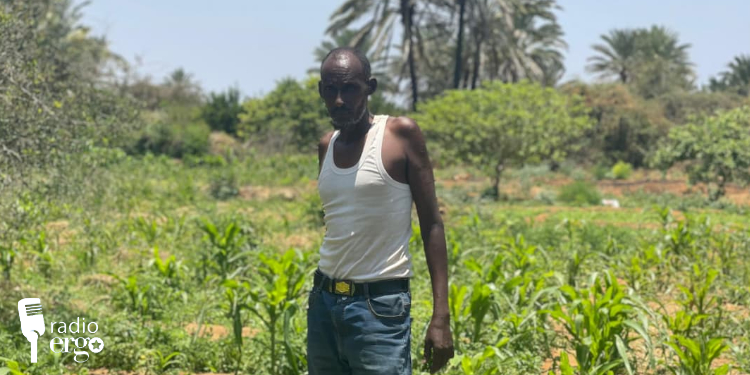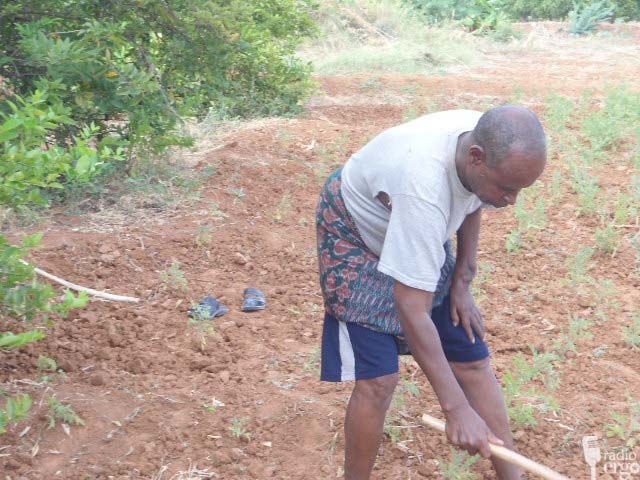(ERGO) – Mohamud Nur Hasan, 39, is now a farmer in Baidoa, proudly supporting his wife and eight children, after experiencing horrors in the Gulf where he had migrated in search of work.
He is among 50 young men who came together to rent farmland after their attempts at overseas migration ended in failure.
“The challenges we faced during migration – imprisonment, ransom demands, and hunger – forced us to think differently,” Mohamud told Radio Ergo.
“I came back with nothing, but now I have a steady income, my freedom, and the chance to live with my family.”
Pooling their savings and modest loans, the young men became farmers and are now selling their produce successfully in Baidoa’s markets.
From his first crops harvested in July, Mohamud earned $800. He expects another harvest at the end of October. The money has lifted his family out of hunger. Two of his children have started school and Koranic lessons at a cost of $40 a month.
Once dependent on relatives for shelter, Mohamud and his family now rent a two-room house. He has managed to save $200 and plans to start a small business on the side.
“My life used to be miserable,” he recalled. “We cooked once a day; the rest was hunger. I begged and sat idly with nothing to do. Today, I wake up in the morning, go to the farm, harvest vegetables, and feed my family. We cook three times a day. My life has improved.”
Mohamud borrowed $300 from relatives to join the farming project. He repaid the debt after their first harvest.
“I have never seen a better life than this, by pooling our strength and investing our labour in the land, this is how hunger can be defeated. There is no greater problem or enemy, than unemployment.”
The group rented 10 farms for $1,000 a year, covering nearly 30 hectares. They dug a well, bought a pump, and planted tomatoes, onions, okra, pumpkins, carrots, cabbage, beans, and sorghum.
Mohamud’s journey into migration began in 2023, when he left Bosaso by boat aiming to get to Saudi Arabia. He was imprisoned in Yemen and released only after his relatives raised a ransom of $1,000. Two and a half years later, he was deported from Saudi Arabia and flown back to Mogadishu.
“It was the worst decision of my life, I returned confused and empty-handed. But today, I no longer worry about where to find food for my children.” He said.
Like Mohamud, Ibrahim Muse Salad, a father of six, also endured imprisonment and ransom demands before being deported earlier this year. Today he earns more than $700 from farming, enough to rent a home for $30 a month and cook three meals a day for his family. He has saved $100 for emergencies.
“At the beginning I feared this plan would fail,” said Ibrahim. “But after four months, we saw results. The biggest relief the farm gave me was my children’s education. Before, I could not afford it. Now three of
them attend Koranic school at $10 a month. I have decided to stay in my country and farm, not to migrate again.”
Paradoxically, if there was one benefit from their miserable journeys abroad, it was seeing agriculture flourishing in Yemen, which gave them the idea of farming on their return to Somalia.
Ishaq Nur Ibrahim, the group’s leader, said they launched the project in March with $15,000 pooled together.
“While abroad, we endured imprisonment and ransom demands because we had no rights. Today, on our own land, we are free and we work for ourselves,” he said.
He explained that they agreed to share both the labour and the profits equally. The experience, he added, has taught them resilience and the importance of cooperation.
“These 10 farms have become the foundation of our new lives. Unemployment and poverty drove us into migration. But after the suffering we endured, we realised we could survive and prosper here at home. The first harvest repaid our debts and gave us income. Farming has become our new hope!” Ibrahim said.
Traders now come directly to their farms, sometimes paying in advance to secure produce. With shortages in the Baidoa markets, demand for their vegetables is strong.











